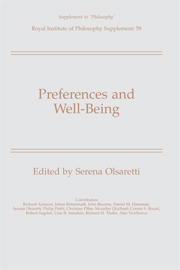Book contents
- Frontmatter
- Contents
- List of Contributors
- “Introduction”
- “Desire Formation and Human Good”
- “Preference Formation and Personal Good”
- “Leading a Life of One's Own: On Well-Being and Narrative Autonomy”
- “Well-Being, Adaptation and Human Limitations”
- “Consequentialism and Preference Formation in Economics and Game Theory”
- “Preferences, Deliberation and Satisfaction”
- “Content-Related and Attitude-Related Reasons for Preferences”
- “Reasoning with Preferences?”
- “Taking Unconsidered Preferences Seriously”
- “Preferences, Paternalism, and Liberty”
- “Preference Change and Interpersonal Comparisons of Welfare”
“Well-Being, Adaptation and Human Limitations”
Published online by Cambridge University Press: 07 May 2010
- Frontmatter
- Contents
- List of Contributors
- “Introduction”
- “Desire Formation and Human Good”
- “Preference Formation and Personal Good”
- “Leading a Life of One's Own: On Well-Being and Narrative Autonomy”
- “Well-Being, Adaptation and Human Limitations”
- “Consequentialism and Preference Formation in Economics and Game Theory”
- “Preferences, Deliberation and Satisfaction”
- “Content-Related and Attitude-Related Reasons for Preferences”
- “Reasoning with Preferences?”
- “Taking Unconsidered Preferences Seriously”
- “Preferences, Paternalism, and Liberty”
- “Preference Change and Interpersonal Comparisons of Welfare”
Summary
Introduction
Philosophical accounts of human well-being face a number of significant challenges. In this paper, I shall be primarily concerned with one of these. It relates to the possibility, noted by Martha Nussbaum and Amartya Sen amongst others, that people's desires and attitudes are malleable and can ‘adapt’ in various ways to the straitened circumstances in which they live. If attitudes or desires adapt in this way it can be argued that the relevant desires or attitudes fail to provide a reliable basis for evaluating well-being. This is, what I shall call the ‘adaptation problem’. Nussbaum and Sen have—in different ways used this argument to motivate their versions of the ‘capability approach’. However, questions remain about the implications of adaptation for philosophical accounts of well-being.
In considering the way in which the adaptation problem can pose difficulties for various views of well-being, I take there to be a significant constraint on such views. In his more recent works, James Griffin has, I think rightly, argued that there are limitations to a human being's capacities—whether these relate to calculative powers, the acquisition and retention of information or impartiality. Griffin thinks that this is particularly significant for ethics because moral philosophers have tended to work with too abstract a picture of human agents. While Griffin has focused on the implications of this point for accounts of moral norms, it is also relevant to accounts of well-being.
- Type
- Chapter
- Information
- Preferences and Well-Being , pp. 83 - 110Publisher: Cambridge University PressPrint publication year: 2006
- 1
- Cited by



